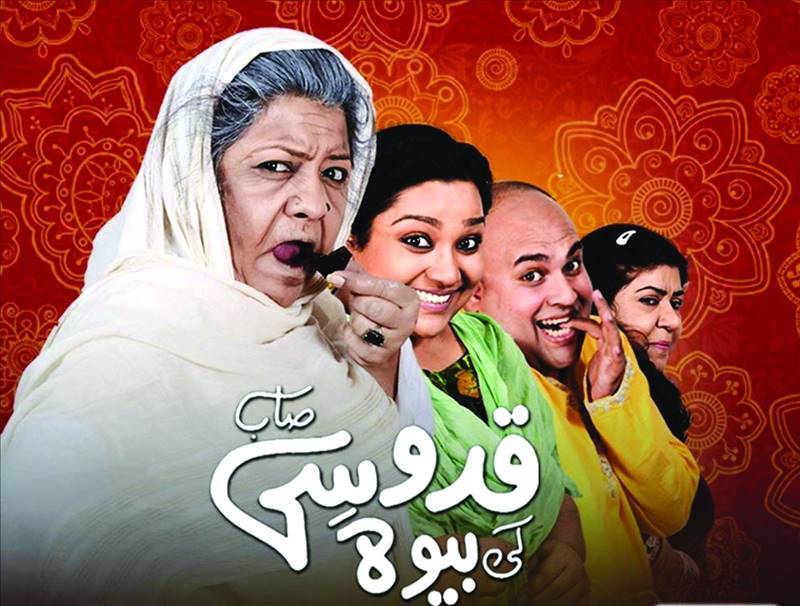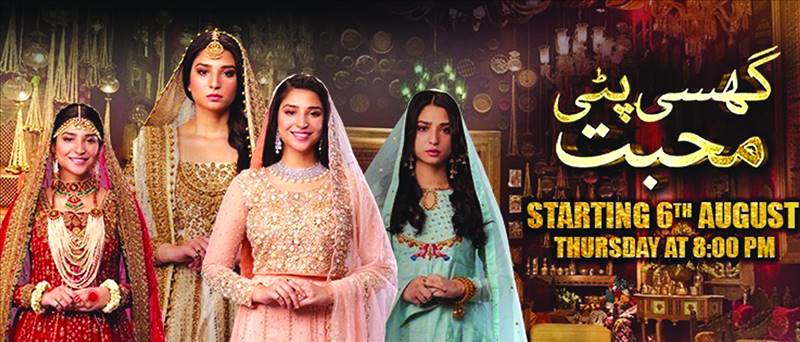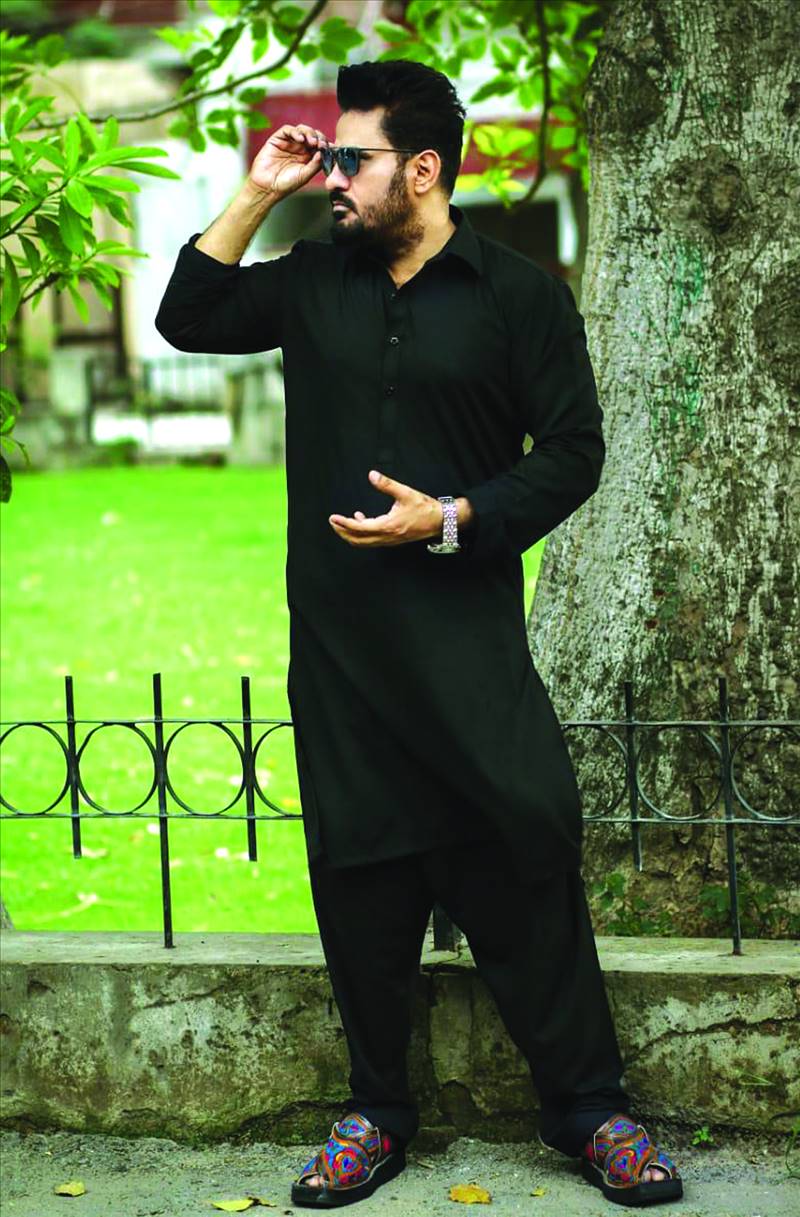
Faseeh Bari Khan is a popular name in the Pakistani drama industry, with a great number of works to his credit such as Quddusi Sahib Ki Bewah, Behkawa, Taar e Ankaboot, Mohabbat Jaaye Bhaar Mein, Khatoon Manzil and Faaltu Larki to name only a few. He stands out as somewhat controversial in Pakistan owing to his bold handling of human sexual psychology. Yet his command over the Urdu language is something which everyone considers commendable and which places him among finest Urdu language dramatists.
After a hiatus of four years, Faseeh Bari Khan has made a proper comeback in the industry with an ARY serial titled Ghisi Piti Mohabbat.
The Friday Times caught up with him to ask a few questions.
Muhammad Ali: Your initial projects such as Ab Yeh Mumkin Nahi and Chaal were not what we consider the characteristic dramatic works of Faseeh Bari Khan. While writing them, did you feel that you were not doing what you wished to do?
Faseeh Bari Khan: Television drama, after all, is a commercial medium and you do not always get to write what you want. In fact, my very first play, Jab Koi Doosra Nahi Hota, which was an adaptation of a stage play that I had written and which was then directed by Atif Hussain for television, was stopped from airing initially, although those were creative times. Yasir Nawaz, who was one of the performers in that play later on approached me to write Jadoo which grew into quite popular a play From here I was introduced to Talat Hussain, as his daughter Tazeen Hussain acted in Jadoo. Both Talat Hussain and Mehreen Jabbar reached out to me after that. While Talat Hussain made me write Ooper Gori Ka Makaan, Mehreen Jababr made me adapt Dial M for Murder into a long play which was called Chaal. It was after these that I wrote my serial Ab Yeh Mumkin Nahi, again for Atif Hussain, and incorporated my light humour in it. After having done all of these works, I gave an idea to Atif to work together on a project based on the real slum lives of populations in Karachi and the idea materialized in the form of Khala Qulsum Ka Qumba which received bags full of appreciation letters at PTV Centre.

So yes: it was my own idea which gave me my breakthrough, but I believe that a writer should be able to write on any topic. I do like my style and feel good when people associate it with me, but I have written a large number of dramatic works of all kinds and for all directors, such as Aik Thi Amma, a Mother’s Day special play directed by Haseeb Hassan and supervised by Iqbal Ansari, who even made me write a soap called Kaanch. The Bulbulay fame actor Nabeel also directed one of my serials, Waada. So, I have done all kinds of work, both commercial and non-commercial, for people and for myself, considering that while writing for television, you have to listen to the people around you while keeping your creativity intact.
M.A.: You have often been the target of strong negative criticism owing to your bold story-lines. Has that ever acted as a setback for you?
FBK: Yes, I have in the past faced a lot of negative criticism on social media, and it continues into the present. In fact, it has also happened that people have said bad things about my family and my upbringing! Mohabbat Jaaye Bhaar Mein and Quddusi Sahib Ki Bewah, while they were admired by the audience, also received their equal share of backlash. But I have never let that get on my nerves because I am very confident about what I write. And I write it with a certain ideology in mind. Neither can I be made to change my beliefs, nor can the people be made to change the way they think, so one should never bother about what others say. I also dislike it when writers worry about the rating of their drama serials. I am of the view that a writer’s responsibility is to write, not to garner ratings and a consistently positive feedback. So, I have never bothered about the kind of response my dramas have received, which undoubtedly has mostly been harsh.

M.A.: You penned Mohini Mansion Ki Cinderellayen out of much love and care but it got stopped in the middle. Did that bother you emotionally?
FBK: Yes, it did. The serial was put off air even before its story had started developing properly, the reason being the channel’s financial issues. I was emotionally attached to Mohini Mansion Ki Cinderellayen and the way Ali Tahir was directing it with proper readings and rehearsals would remind me of the good times of Pakistani television drama. When it got shut, I felt as if I had been going through a beautiful feeling and somebody had suddenly stopped me from enjoying it. I often felt that I would face a nervous breakdown sooner or later and I couldn’t even properly work on my later commitments. It took quite a long time for me to snap out of the trauma of Mohini Mansion Ki Cinderellayen being shut down. We had planned so much about it, from the storyline to the characters – and all went to waste.
M.A.: Since it was your first serial after you moved to Lahore, did it strike you that Lahore has not turned out to be a lucky city for you?
FBK: No, not at all. Lahore is certainly not to be blamed. I have loved the city since my childhood and that’s why I left Karachi and came here. I now work from here and send it to Karachi. Moreover, the comfort and peace that I have attained in Lahore is the kind which I could never have gotten if I had continued to live in Karachi. The work environment here is more conducive and productive for me.

M.A.: Most of your scripts have been directed by Mazhar Moin in the past. Now that you don’t work with him anymore, do you miss your collaborations with him?
FBK: Mazhar is my best friend and I definitely miss working with him. He would involve me in every little aspect of the directorial process and would never point out flaws in my scripts. He always gave me the courage to write on whatever topic I liked, and therefore we have produced together the kind of stories which people may still consider too bold for the Pakistani television industry. In fact, my currently running serial, Ghisi Pitti Mohabbat was also to be directed by him but the channel chose Ahmed Bhatti as the director. Even though lately our paths have diverged and both he and I have worked with different and new teams, we remain best friends and talk on a daily basis. Our friendship is in no way affected.
M.A.: Tell us something about your writing process. At what time do you usually write and for how long?
FBK: To be honest, I don’t follow any schedule. I am an extremely lazy person and don’t bother to write until and unless I am told that my deadline has arrived. Before that, I spend my leisure time and enjoy it to its best.
M.A.: Writers are usually sensitive people and often encounter phases in which they may not feel like doing anything. How do you manage to write during such periods?
FBK: Yes, one does get stuck at times. But work is work and you have to do it. To tell you the truth, I was grieving my mother’s death and I was asked to submit episodes of Quddusi Sahib Ki Bewah because the serial was on air and they had no ready-made episodes to be sent on screen. Everyone knows that Quddusi Sahib Ki Bewah was a comedy drama and writing such a piece after my mother had passed away was so difficult a job. I used to sit down to write and would keep sitting for hours and hours without writing anything. My mind used to be very numb and I still don’t know how I managed to write those episodes.
M.A.: You have often talked about homosexual individuals in your dramatic works. How important do you think it is to address sexuality?
FBK: It’s extremely important. We really need to understand the souls of people who are different from us and possess sexual orientations that might be considered different from what the society expects to be normal. We tend to focus on the bodily aspects of people and not their spirits. I remember watching a serial in which a transgender person is forced to change and transform into a man and lead a ‘perfect’ life. You may do it with surgeries and therapies and all but you cannot change what the person feels inside. This is what I also tried to tell in my play Bhed Bhaao, based on a same-sex relationship.
M.A.: Which Pakistani dramatists do you admire from both your seniors and contemporaries?
FBK: I am a great admirer of Dr. Anwar Sajjad’s scripts. Also, I consider Bano Qudsia’s characterization the strongest. Although her stories during General Zia ul Haq’s era did not remain as appealing as before, she never lost her grip over characterization. Apart from these two, Noor-ul-Huda Shah’s Jungle and Ali Baba’s Sindhi dramas Dungi Manjho Dariya and Zindagi Olra are works I can never get over. Abdul Qadir Junejo has also been a very good dramatist, along with Munir Qureshi (Munnu Bhai), who I feel is underrated but magnificent. From among my contemporaries, I admire Mustafa Afridi, Bee Gul and Saji Gul a lot.
M.A.: What are you currently working on? Do you have any plans to write a web-series, considering that many Pakistani dramatists are moving towards the medium?
FBK: Currently, I am working on a script for Fahad Mustafa’s production house, Bing Bang Productions. It is being directed by Aabis Raza. About web-series, yes I would definitely go for it, although I feel that the kind of topics which web-series are trying to address are those on which I have already worked many times and many years ago. But yes, I won’t step away from it, if given the opportunity.
Muhammad Ali is an M.Phil scholar and a former visiting lecturer at GCU, Lahore. His interest lies in indigenous literature, the specific research areas being Partition novel, Environmental Literature emerging from South Asia and classical and contemporary Pakistani television drama. His research on Sahira Kazmi’s “Zaib un Nisa” which was a part of his graduation thesis has been presented on various platforms including Olomopolo Media. This interview is a part of a series of interviews in which various Pakistani celebrities including writers, actors and directors will be asked questions regarding their professional work. The writer can be reached at m.ali_aquarius85@yahoo.com
After a hiatus of four years, Faseeh Bari Khan has made a proper comeback in the industry with an ARY serial titled Ghisi Piti Mohabbat.
The Friday Times caught up with him to ask a few questions.
***
Muhammad Ali: Your initial projects such as Ab Yeh Mumkin Nahi and Chaal were not what we consider the characteristic dramatic works of Faseeh Bari Khan. While writing them, did you feel that you were not doing what you wished to do?
Faseeh Bari Khan: Television drama, after all, is a commercial medium and you do not always get to write what you want. In fact, my very first play, Jab Koi Doosra Nahi Hota, which was an adaptation of a stage play that I had written and which was then directed by Atif Hussain for television, was stopped from airing initially, although those were creative times. Yasir Nawaz, who was one of the performers in that play later on approached me to write Jadoo which grew into quite popular a play From here I was introduced to Talat Hussain, as his daughter Tazeen Hussain acted in Jadoo. Both Talat Hussain and Mehreen Jabbar reached out to me after that. While Talat Hussain made me write Ooper Gori Ka Makaan, Mehreen Jababr made me adapt Dial M for Murder into a long play which was called Chaal. It was after these that I wrote my serial Ab Yeh Mumkin Nahi, again for Atif Hussain, and incorporated my light humour in it. After having done all of these works, I gave an idea to Atif to work together on a project based on the real slum lives of populations in Karachi and the idea materialized in the form of Khala Qulsum Ka Qumba which received bags full of appreciation letters at PTV Centre.

“It took quite a long time for me to snap out of the trauma of Mohini Mansion Ki Cinderellayen being shut down”
So yes: it was my own idea which gave me my breakthrough, but I believe that a writer should be able to write on any topic. I do like my style and feel good when people associate it with me, but I have written a large number of dramatic works of all kinds and for all directors, such as Aik Thi Amma, a Mother’s Day special play directed by Haseeb Hassan and supervised by Iqbal Ansari, who even made me write a soap called Kaanch. The Bulbulay fame actor Nabeel also directed one of my serials, Waada. So, I have done all kinds of work, both commercial and non-commercial, for people and for myself, considering that while writing for television, you have to listen to the people around you while keeping your creativity intact.
M.A.: You have often been the target of strong negative criticism owing to your bold story-lines. Has that ever acted as a setback for you?
FBK: Yes, I have in the past faced a lot of negative criticism on social media, and it continues into the present. In fact, it has also happened that people have said bad things about my family and my upbringing! Mohabbat Jaaye Bhaar Mein and Quddusi Sahib Ki Bewah, while they were admired by the audience, also received their equal share of backlash. But I have never let that get on my nerves because I am very confident about what I write. And I write it with a certain ideology in mind. Neither can I be made to change my beliefs, nor can the people be made to change the way they think, so one should never bother about what others say. I also dislike it when writers worry about the rating of their drama serials. I am of the view that a writer’s responsibility is to write, not to garner ratings and a consistently positive feedback. So, I have never bothered about the kind of response my dramas have received, which undoubtedly has mostly been harsh.

M.A.: You penned Mohini Mansion Ki Cinderellayen out of much love and care but it got stopped in the middle. Did that bother you emotionally?
FBK: Yes, it did. The serial was put off air even before its story had started developing properly, the reason being the channel’s financial issues. I was emotionally attached to Mohini Mansion Ki Cinderellayen and the way Ali Tahir was directing it with proper readings and rehearsals would remind me of the good times of Pakistani television drama. When it got shut, I felt as if I had been going through a beautiful feeling and somebody had suddenly stopped me from enjoying it. I often felt that I would face a nervous breakdown sooner or later and I couldn’t even properly work on my later commitments. It took quite a long time for me to snap out of the trauma of Mohini Mansion Ki Cinderellayen being shut down. We had planned so much about it, from the storyline to the characters – and all went to waste.
M.A.: Since it was your first serial after you moved to Lahore, did it strike you that Lahore has not turned out to be a lucky city for you?
FBK: No, not at all. Lahore is certainly not to be blamed. I have loved the city since my childhood and that’s why I left Karachi and came here. I now work from here and send it to Karachi. Moreover, the comfort and peace that I have attained in Lahore is the kind which I could never have gotten if I had continued to live in Karachi. The work environment here is more conducive and productive for me.

M.A.: Most of your scripts have been directed by Mazhar Moin in the past. Now that you don’t work with him anymore, do you miss your collaborations with him?
FBK: Mazhar is my best friend and I definitely miss working with him. He would involve me in every little aspect of the directorial process and would never point out flaws in my scripts. He always gave me the courage to write on whatever topic I liked, and therefore we have produced together the kind of stories which people may still consider too bold for the Pakistani television industry. In fact, my currently running serial, Ghisi Pitti Mohabbat was also to be directed by him but the channel chose Ahmed Bhatti as the director. Even though lately our paths have diverged and both he and I have worked with different and new teams, we remain best friends and talk on a daily basis. Our friendship is in no way affected.
M.A.: Tell us something about your writing process. At what time do you usually write and for how long?
FBK: To be honest, I don’t follow any schedule. I am an extremely lazy person and don’t bother to write until and unless I am told that my deadline has arrived. Before that, I spend my leisure time and enjoy it to its best.
“We tend to focus on the bodily aspects of people and not their spirits. I remember watching a serial in which a transgender person is forced to change and transform into a man and lead a ‘perfect’ life”
M.A.: Writers are usually sensitive people and often encounter phases in which they may not feel like doing anything. How do you manage to write during such periods?
FBK: Yes, one does get stuck at times. But work is work and you have to do it. To tell you the truth, I was grieving my mother’s death and I was asked to submit episodes of Quddusi Sahib Ki Bewah because the serial was on air and they had no ready-made episodes to be sent on screen. Everyone knows that Quddusi Sahib Ki Bewah was a comedy drama and writing such a piece after my mother had passed away was so difficult a job. I used to sit down to write and would keep sitting for hours and hours without writing anything. My mind used to be very numb and I still don’t know how I managed to write those episodes.
M.A.: You have often talked about homosexual individuals in your dramatic works. How important do you think it is to address sexuality?
FBK: It’s extremely important. We really need to understand the souls of people who are different from us and possess sexual orientations that might be considered different from what the society expects to be normal. We tend to focus on the bodily aspects of people and not their spirits. I remember watching a serial in which a transgender person is forced to change and transform into a man and lead a ‘perfect’ life. You may do it with surgeries and therapies and all but you cannot change what the person feels inside. This is what I also tried to tell in my play Bhed Bhaao, based on a same-sex relationship.
M.A.: Which Pakistani dramatists do you admire from both your seniors and contemporaries?
FBK: I am a great admirer of Dr. Anwar Sajjad’s scripts. Also, I consider Bano Qudsia’s characterization the strongest. Although her stories during General Zia ul Haq’s era did not remain as appealing as before, she never lost her grip over characterization. Apart from these two, Noor-ul-Huda Shah’s Jungle and Ali Baba’s Sindhi dramas Dungi Manjho Dariya and Zindagi Olra are works I can never get over. Abdul Qadir Junejo has also been a very good dramatist, along with Munir Qureshi (Munnu Bhai), who I feel is underrated but magnificent. From among my contemporaries, I admire Mustafa Afridi, Bee Gul and Saji Gul a lot.
M.A.: What are you currently working on? Do you have any plans to write a web-series, considering that many Pakistani dramatists are moving towards the medium?
FBK: Currently, I am working on a script for Fahad Mustafa’s production house, Bing Bang Productions. It is being directed by Aabis Raza. About web-series, yes I would definitely go for it, although I feel that the kind of topics which web-series are trying to address are those on which I have already worked many times and many years ago. But yes, I won’t step away from it, if given the opportunity.
Muhammad Ali is an M.Phil scholar and a former visiting lecturer at GCU, Lahore. His interest lies in indigenous literature, the specific research areas being Partition novel, Environmental Literature emerging from South Asia and classical and contemporary Pakistani television drama. His research on Sahira Kazmi’s “Zaib un Nisa” which was a part of his graduation thesis has been presented on various platforms including Olomopolo Media. This interview is a part of a series of interviews in which various Pakistani celebrities including writers, actors and directors will be asked questions regarding their professional work. The writer can be reached at m.ali_aquarius85@yahoo.com

